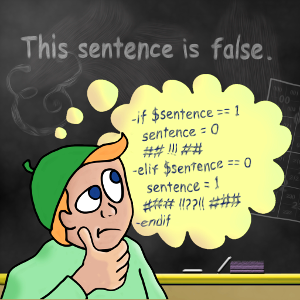if, elif, else and fi
 | An -if … -elif … -else … -fi series conditionally execute command sequences (aka, conditional blocks). \n\n1. -if introduces a conditional block and takes as a parameter a [mathematical expression](https://gmic.eu/reference/mathematical_expressions.html#top). Expressions returning zero are taken to be __False__; the conditional block does not execute. Otherwise, when __True__, the conditional block executes. The mathematical expression need not be quoted or embedded in curly braces within command scripts. \n\nCommands following -if, up to and excluding -elif, -else or -fi constitute the conditional block. Conditional blocks may be empty; that is, an -elif, -else or -fi immediately follows. -if must have a matching -fi`, concluding a series of conditional blocks. |
2. -elif optionally follows -if or prior -elif commands and introduces alternative conditional blocks. These execute only if -elif's associated mathematical expression is True and none of the preceding conditional blocks have executed. -elif cannot begin conditional command sequences, nor follow -else. In light of this, -elif commands always form contiguous chains with other -elif commands.
3. -else optionally introduces a default command block that executes only if none of the preceding conditional blocks have executed. It does not take a parameter and its commands, if any, follow up to a concluding -fi command.
4. -fi terminates sequences of conditional blocks. -if and -fi must be paired. Commands following -fi unconditionally execute.
At most, only one conditional block executes. The command processor evaluates in order of appearance the mathematical expressions associated with each -if and -elif command and executes the affiliated conditional block for the first mathematical expression that is True. The command processor then skips to the first command following -fi; bypassing the remaining blocks. If no expression returns True, the command processor executes the block associated with the default -else command, if it exists. Otherwise, no blocks in the conditional sequence execute.
Testing For File Objects
Prior to G'MIC version 2.6, -if and -elif could take file system objects as well as mathematical expressions and test for their existence; this is no longer the case. Instead, use math expressions with file system query functions that perform similar roles: isfile( <file system object reference> ) and isdir( <file system object reference> ) return True if the reference exists and is of the correct file object type. Some 1.6x tutorials may reflect the older, now unsupported, notation.Examples
| 1. | -if 0 -echo "I never execute!" -fi |
| 2. | -if 1 -echo "I always execute!" -else -echo "I never execute!" -fi |
| 3. | -if u>0.5 -echo "More than half!" -else -echo "Half or less than!" -fi |
| 4. | chk={u} -if $chk>=0.75 -echo "Upper quarter. Check is "$chk"." -elif $chk>=0.50 -echo "Upper middle quarter. Check is "$chk"." -elif $chk>=0.25 -echo "Lower middle quarter. Check is "$chk"." -else -echo "Bottom quarter. Check is "$chk"." -fi |
The last example is a sieve. Note that prior tests implicitly set the upper boundary of those that follow, which only need to test for lower boundaries. This is a consequence of at most one block executing. The block following -else can only execute for "bottom quarter" values of u less than 0.25.
Command Reference
$ gmic -h if
if (+):
condition
Start a 'if...[elif]...[else]...fi' block and test if specified condition holds.
'condition' is a mathematical expression, whose evaluation is interpreted as { 0:False | other:True }.
Example:
[#1] image.jpg if ia<64 add 50% elif ia<128 add 25% elif ia<192 sub 25% else sub 50% fi cut 0,255
Tutorial: https://gmic.eu/tutorial/iffi
if (+):
condition
Start a 'if...[elif]...[else]...fi' block and test if specified condition holds.
'condition' is a mathematical expression, whose evaluation is interpreted as { 0:False | other:True }.
Example:
[#1] image.jpg if ia<64 add 50% elif ia<128 add 25% elif ia<192 sub 25% else sub 50% fi cut 0,255
Tutorial: https://gmic.eu/tutorial/iffi


 Home
Home Download
Download News
News Mastodon
Mastodon Bluesky
Bluesky X
X Summary - 17 Years
Summary - 17 Years Summary - 16 Years
Summary - 16 Years Summary - 15 Years
Summary - 15 Years Summary - 13 Years
Summary - 13 Years Summary - 11 Years
Summary - 11 Years Summary - 10 Years
Summary - 10 Years Resources
Resources Technical Reference
Technical Reference Scripting Tutorial
Scripting Tutorial Video Tutorials
Video Tutorials Wiki Pages
Wiki Pages Image Gallery
Image Gallery Color Presets
Color Presets Using libgmic
Using libgmic G'MIC Online
G'MIC Online Community
Community Discussion Forum (Pixls.us)
Discussion Forum (Pixls.us) GimpChat
GimpChat IRC
IRC Report Issue
Report Issue